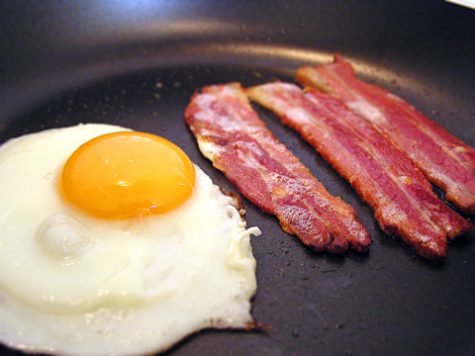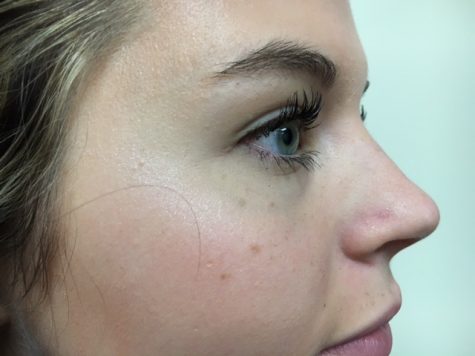Recipe for Success on AP Tests

What do you need to do well on your tests?
AP season: every student’s favorite time of the year. The beginning of May is when students put their knowledge to the test, hoping their year of hard work in Advanced Placement courses will pay off. Due to the tests’ significance and the potential thousands of dollars in college savings, students can be overwhelmed with many questions on how to do their best on the test. Lucky for you, I am here to help with this stress!
Do I really need to eat breakfast?
A recent survey of 15,000 people was conducted by the Kellogg Company pertaining to breakfast consumption in America. The results were especially alarming: only 36 percent of high school students eat breakfast everyday. The negative effects of skipping breakfast are becoming very apparent in schools all around the country. AboutKidsHeatlth reports some obvious reasons why this is such a large issue. These reasons includes students being less attentive in class and experiencing a lack of fuel for their brain to work its best on test day.
There are many more unknown risks of skipping breakfast though–it can cause a teenager’s metabolism to slow down. On top of this, skipping breakfast greatly hinders athletic ability, considering increased caloric needs. These risks, reported by an article in High School Illustrated–added to breakfast’s benefits of increased attentiveness and brain fuel–make it clear why breakfast has always been coined “the most important meal of the day.”
Thus, the answer is “yes” to eating breakfast on test day–and every day for that matter.
Although students have been been lectured for years on eating breakfast, some still struggle to find a breakfast that works for them on test day. A recent study published by the University of Missouri found that there is a strong correlation between eating protein for breakfast and appetite control. Subjects experienced less hunger throughout the day when they ate a protein packed breakfast. Doing so would allow students to focus on their test, rather than their hunger.
Many AVHS students already follow this trend.

Eggs and bacon are packed with the protein necessary to do well on a test
Junior Calvin Hill eats eggs and bacon on test day because “it’s super important to get good protein because that enhances skills important to testing.”
Brooke Lewis echoes that sentiment noting that “eggs are a good source of protein.”
Years of studies and experiments make it obvious: a breakfast consisting of protein will allow you to optimize your abilities on your exams.
What should I wear?
There are two types of people on test day: those who “dress well to test well” and those who dress for comfort. Although there have been studies conducted by Northwestern and studies published in the Family and Consumer Sciences Research Journal, they are largely inconclusive. There are benefits to both dressing comfy and dressing well. Dressing more professional on test day can increase intellectual thinking; however, dressing more casual can increase test scores by allowing your focus to be strictly on your test.
The best answer to this question is to find what works best for you. Nobody knows your style more than you, so you don’t necessarily need to dress your best for the test; dress in what will make you do your best!
When should I go to bed?
Results from a study conducted by Ghent and Ku Leuven universities in Belgium provide great insight to this question. Students who got the recommended seven hours of sleep per night scored almost 10 percent higher on an exam than their sleep-deprived peers.
This is really no surprise considering the numerous other studies on sleep. WebMD cites the following health boosts as reasons to get the recommended 7 to 8 hours of sleep:
- Better Health: reduce risks of heart disease, heart attacks and obesity
- Less Pain: sleep can “supplement medication for pain”
- Better Mood: help regulate emotions
- Clearer Thinking: better cognition and attentiveness
Many AVHS students feel that getting the recommended sleep does help you on your tests.

Don’t stay up late; get the necessary sleep and avoid cramming
Junior Nina Lind said, “I do try to go to bed earlier the night before exams because I think getting a good night sleep is better than staying up late…being exhausted.”
Junior Ford Friedel goes to bed earlier “to ensure that I can perform at my highest level during my exam.”
As illustrated by students and scientists alike, getting enough sleep is critical before a test. Make sure to get to bed early enough for your brain to function properly during your exam.
Is it worth staying up late the night before to cram?
Although studying can ensure a better score (and your family putting the score report on the fridge), sleep is just as important. UCLA recently released a study answering this question: is sleep better the night before or is studying more beneficial? Researchers said “what students may fail to appreciate is that adequate sleep is also important for academics.” In their effort to decide between sleep and studying, they reached the conclusion that those students who sacrifice sleep for studying are more likely to have an increase in academic problems the next day.
Many Apple Valley students agree with this study’s conclusion.
Junior Joe Larson said “It’s not worth it to cram because it doesn’t really help in the end.”
Tom Crippes feels similarly: “Staying up to study won’t help you in the long run; you either know the information or you don’t. Cramming very late at night won’t help you remember [it].”
As demonstrated above, sleep is crucial to physical and mental health, so it is no surprise that professionals are advising sleep vs. studying the night before a big exam.
With these tips, all AVHS students are ready for their year’s worth of hard work to pay off when they do their best on the tests.








Alicia • May 5, 2016 at 3:42 am
Nice work. Great tips on how to prepare for your AP exams.